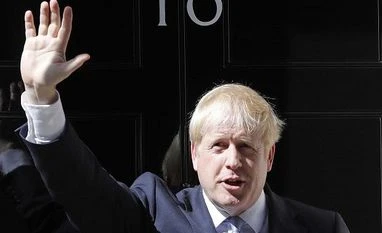Boris Johnson urges EU to renegotiate Brexit as pound hits a two-year low
Johnson wants to change the exit terms struck by predecessor Theresa May but insists he will leave the EU without any agreement at all if necessary on October 31
)
File photo of Boris Johnson. Photo: AP/PTI
British Prime Minister Boris Johnson on Monday urged EU leaders to drop their opposition to renegotiating Brexit, as the pound slumped on growing concerns about a no-deal departure.
Johnson, who took office last week, wants to change the exit terms struck by predecessor Theresa May but insists he will leave the European Union without any agreement at all if necessary on October 31.
Brussels has said it will not reopen the text.
"The withdrawal agreement is dead," Johnson told reporters during his first visit to Scotland.
"I am confident we will get a deal but it is also right we prepare for no deal," he said.
Also Read
The government has not yet announced plans for Johnson to visit EU capitals, and a spokeswoman indicated he would not go until Brussels changes its stance.
"He obviously wants to meet EU leaders and negotiate but not to be sat down and told that the EU cannot possibly reopen the withdrawal agreement," the spokeswoman said.
The Confederation for British Industry (CBI), the country's top business lobby group, said companies now needed to be on an "emergency footing" because of the growing likelihood of no deal.
The pound lost more than one percent of its value against the dollar on Monday, hitting a two-year low.
In a report, the CBI warned that both Britain and the EU were not prepared for a no-deal Brexit and urged businesses to step up contingency plans.
The group's head of EU negotiations Nicole Sykes tweeted that it was "like putting sandbags down for a flood".
"Your kitchen's still going to be underwater but MAYBE we can save the bedroom upstairs," she wrote.
The Institute for Government also warned that a no-deal Brexit would "dominate government for years", allowing little room for other domestic priorities outlined by Johnson such as health, education and transport.
The think-tank said such an outcome would also place the United Kingdom, which includes England, Scotland, Wales and Northern Ireland, "under unprecedented pressure".
On his first visit to Scotland as prime minister, Johnson visited a military base before meeting Scottish Conservative leader Ruth Davidson, who has been opposed to a no-deal Brexit.
He was also to meet First Minister Nicola Sturgeon, the leader of the separatist and pro-European Scottish National Party (SNP), who said the London government was driving the country towards a "disaster".
Sturgeon said last week that Scotland, which voted to remain in the EU in the 2016 referendum, needed an "alternative option" to Johnson's Brexit strategy.
She told Johnson that the devolved Scottish Parliament would consider legislation in the coming months for another vote on leaving the UK.
Irish Prime Minister Leo Varadkar has also said that a no-deal Brexit would make more people in Northern Ireland "come to question the union" with Britain.
Johnson, who will take the symbolic title of Minister for the Union alongside that of prime minister, announced ?300 million ($370 million, 332 million euros) of new investment for Scotland, Wales and Northern Ireland ahead of Monday's visit.
"Important projects like the government's growth deals... will open up opportunities across our union so people in every corner of the United Kingdom can realise their potential," he said.
"I look forward to visiting Wales and Northern Ireland to ensure that every decision I make as prime minister promotes and strengthens our union," he added.
Johnson plans to visit local farmers in Wales and discuss the ongoing talks to restore the devolved government when he visits Northern Ireland. The investment boost comes after the prime minister announced a 3.6 billion pounds fund supporting 100 towns in England, raising suggestions that he is already in campaign mode for an election.
Many MPs are opposed to leaving the EU without a deal, and could try and topple the government in an attempt to prevent it, potentially triggering a general election.
More From This Section
Don't miss the most important news and views of the day. Get them on our Telegram channel
First Published: Jul 29 2019 | 8:50 PM IST


